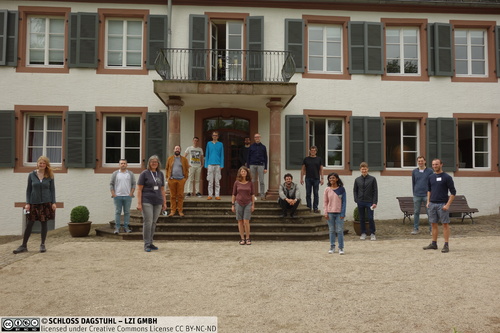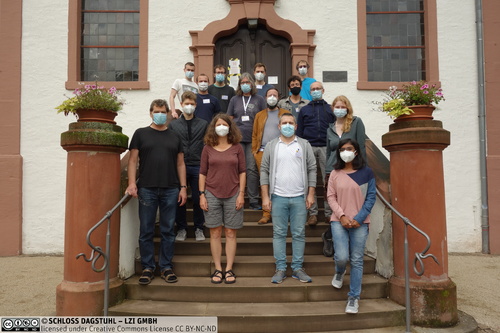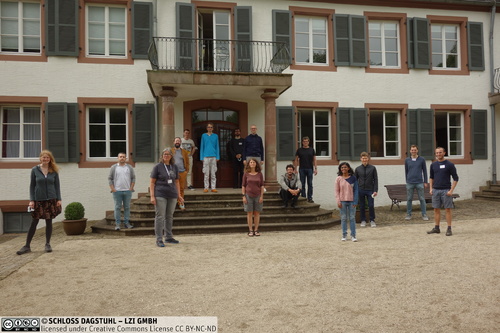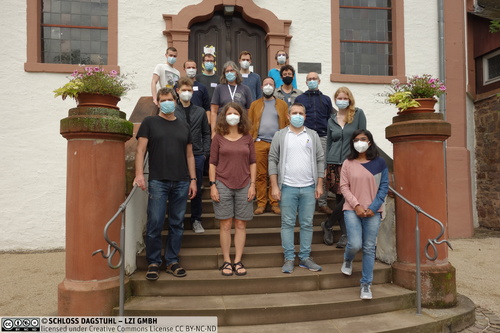Dagstuhl Seminar 21331
Coalition Formation Games
( Aug 15 – Aug 20, 2021 )
Permalink
Organizers
- Edith Elkind (University of Oxford, GB)
- Judy Goldsmith (University of Kentucky - Lexington, US)
- Anja Rey (Universität Köln, DE)
- Jörg Rothe (Heinrich-Heine-Universität Düsseldorf, DE)
Contact
- Michael Gerke (for scientific matters)
- Jutka Gasiorowski (for administrative matters)
There are many situations in which individuals will choose to act as a group, or coalition. Examples include social clubs, political parties, partnership formation, and legislative voting. Coalition formation games are a class of cooperative games where the aim is to partition a set of agents into coalitions, according to some criteria, such as coalitional stability or maximization of social welfare. We are particularly interested in a subclass of coalition formation games, hedonic games, which were first proposed by Drèze and Greenberg (1980) and later formalized by Banerjee et al. (2001) and Bogomolnaia and Jackson (2002). Hedonic sames are distinguished from general coalition formation games by the requirement that each agent's utility is wholly derived from the members of their own coalition.
This Dagstuhl Seminar brings multiple approaches and viewpoints to the study of coalition formation games, and in particular hedonic games, mainly from the perspective of computer science and economics. Particular topics to be discussed in talks and working groups include (but are not limited to):
- succinctly representable preferences over coalitions;
- the existence and verification of stable coalition structures (for various stability concepts);
- the computational complexity of finding or verifying stable or optimal partitions, or even determining whether such partitions exist;
- designing (if possible, efficient) algorithms for finding stable or optimal (or nearly so) coalition structures, or for verifying that a coalition structure is (nearly) stable or optimal;
- stability notions restricted to social networks or other networks;
- matching markets and matching under preferences, and their relation to hedonic games;
- dynamics of coalition formation; and
- group activity selection.
The overarching theme of this Dagstuhl Seminar is to bring together different communities working in coalition formation and hedonic games from various perspectives in computer science and economics and to bridge and bundle their research activities. Participants can form working groups that each will focus on exploring some of the challenging open questions of the field – this is coalition formation in action. Much of the great atmosphere of the seminars at Schloss Dagstuhl comes from informal meetings besides the official schedule, with participants doing leisure activities together and enjoying other joint undertakings – this is group activity selection in practice.
 Edith Elkind, Judy Goldsmith, Anja Rey, and Jörg Rothe
Edith Elkind, Judy Goldsmith, Anja Rey, and Jörg Rothe
As mentioned, coalition formation games occur in many real-world settings. We are particularly interested in a subclass of coalition formation games, hedonic games, which were first proposed by Drèze and Greenberg [1] and later formalized by Banerjee et al. [2] and Bogomolnaia and Jackson [3]. Hedonic games are distinguished from general coalition formation games by the requirement that each agent’s utility is wholly derived from the members of their own coalition.
This Dagstuhl Seminar brought multiple approaches and viewpoints to the study of coalition formation games, and in particular hedonic games, mainly from the perspective of computer science and economics. Particular topics that were discussed in talks and working groups include:
- succinctly representable preferences over coalitions;
- evolving preferences;
- the existence and verification of stable coalition structures (for various stability concepts);
- the computational complexity of finding or verifying stable or optimal partitions, or even determining whether such partitions exist;
- designing (if possible, efficient) algorithms for finding stable or optimal (or nearly so) coalition structures, or for verifying that a coalition structure is (nearly) stable or optimal;
- stability notions restricted to social networks or other networks;
- matching markets and matching under preferences, and their relation to hedonic games;
- dynamics of coalition formation;
- and group activity selection.
The overarching theme of this Dagstuhl Seminar was to bring together different communities working in coalition formation and hedonic games from various perspectives in computer science and economics and to bridge and bundle their research activities.
Much of the great atmosphere of the seminars at Schloss Dagstuhl comes from informal meetings besides the official schedule, with participants doing leisure activities together and enjoying other joint undertakings - this is, by the way, coalition formation in practice. Owing to the hybrid mode and pandemic-related restrictions, it was unfortunately not possible for us to organize group activities with all participants. However, due to the great technical support at Schloss Dagstuhl, the participants - online and on site - were able to take part in talks, discussions and working groups interactively to explore some of the challenging open questions of the field.
The organizers thank all participants for interesting talks and discussions. We also thank Schloss Dagstuhl for the technical preparation and support that made this hybrid seminar possible.
References
- Dreze, Jacques H and Greenberg, Joseph. Hedonic Coalitions: Optimality and Stability. Econometrica: Journal of the Econometric Society (1980): 987-1003.
- Banerjee, Suryapratim, Hideo Konishi, and Tayfun Sönmez. Core in a Simple Coalition Formation Game. Social Choice and Welfare 18.1 (2001): 135-153.
- Bogomolnaia, Anna, and Matthew O. Jackson. The Stability of Hedonic Coalition Structures. Games and Economic Behavior 38.2 (2002): 201-230.
 Edith Elkind, Judy Goldsmith, Christian Laußmann, Anja Rey, and Jörg Rothe
Edith Elkind, Judy Goldsmith, Christian Laußmann, Anja Rey, and Jörg Rothe
- Niclas Boehmer (TU Berlin, DE) [dblp]
- Grégory Bonnet (Caen University, FR) [dblp]
- Florian Brandl (Universität Bonn, DE) [dblp]
- Robert Bredereck (HU Berlin, DE) [dblp]
- Martin Bullinger (TU München, DE) [dblp]
- Edith Elkind (University of Oxford, GB) [dblp]
- Piotr Faliszewski (AGH University of Science & Technology - Krakow, PL) [dblp]
- Shiri Heffetz (Ben Gurion University - Beer Sheva, IL)
- Martin Hoefer (Goethe-Universität - Frankfurt am Main, DE) [dblp]
- Anna Maria Kerkmann (Heinrich-Heine-Universität Düsseldorf, DE) [dblp]
- Bettina Klaus (University of Lausanne, CH) [dblp]
- Jérôme Lang (CNRS - Paris, FR) [dblp]
- Christian Laußmann (Heinrich-Heine-Universität Düsseldorf, DE)
- Seckin Özbilen (University of Lausanne, CH)
- Jörg Rothe (Heinrich-Heine-Universität Düsseldorf, DE) [dblp]
- Sanjukta Roy (TU Wien, AT) [dblp]
- Chris Addington (University of Kentucky - Lexington, US) [dblp]
- Nathan Arnold (University of Kentucky - Lexington, US)
- Haris Aziz (UNSW - Sydney, AU) [dblp]
- Vittorio Bilo (University of Salento - Lecce, IT) [dblp]
- Andreas Darmann (Universität Graz, AT) [dblp]
- Gabrielle Demange (Paris School of Economics, FR) [dblp]
- Hendrik Fichtenberger (Universität Wien, AT) [dblp]
- Abhek Ghosh (University of Oxford, GB) [dblp]
- Judy Goldsmith (University of Kentucky - Lexington, US) [dblp]
- Sushmita Gupta (The Institute of Mathematical Sciences - Chennai, IN) [dblp]
- Paul Harrenstein (University of Oxford, GB) [dblp]
- Ayumi Igarashi (National Institute of Informatics - Tokyo, JP) [dblp]
- Joanna Kaczmarek (Heinrich-Heine-Universität Düsseldorf, DE) [dblp]
- Panagiotis Kanellopoulos (University of Essex - Colchester, GB) [dblp]
- Michael McKay (University of Glasgow, GB) [dblp]
- Tomasz P. Michalak (University of Warsaw, PL) [dblp]
- Anja Rey (Universität Köln, DE) [dblp]
- Jacob Schlueter (Kyushu University - Fukuoka, JP) [dblp]
- Matthew Spradling (University of Michigan - Flint, US) [dblp]
- Taiki Todo (Kyushu University - Fukuoka, JP) [dblp]
- Anaëlle Wilczynski (CentraleSupélec - Gif-sur-Yvette, FR) [dblp]
- Gerhard J. Woeginger (RWTH Aachen, DE) [dblp]
- Makoto Yokoo (Kyushu University - Fukuoka, JP) [dblp]
- Yair Zick (University of Massachusetts - Amherst, US) [dblp]
Classification
- Computational Complexity
- Computer Science and Game Theory
- Social and Information Networks
Keywords
- coalition formation games
- hedonic games
- preferences
- cooperative game theory





 Creative Commons BY 3.0 DE
Creative Commons BY 3.0 DE
